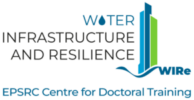Meet Rowan Pearce
Email: [email protected]
Academic and Industrial affiliations: Cranfield University, Anglian Water, Northumbrian Water, Scottish Water and Thames Water
Title of research project: Delivering a Resilient Approach to Tertiary Phosphorus Removal from Wastewater

Phosphorus is widely considered to be the limiting nutrient in freshwater systems and therefore the main contaminant of concern regarding eutrophication. Wastewater treatment plant discharges are a key point source of phosphorus, and therefore subject to regulation. To maintain good ecological status of rivers in line with the water framework directive, discharge consents are being lowered in many cases to below 1 mg/L TP (total phosphorus), and potentially as low as 0.1 mg/L TP. Current understanding and operational methods of standard treatment processes employed are insufficient to consistently achieve these targets in a sustainable and affordable manner.
Historically, phosphorus within wastewater has been characterised by a divide into “soluble” and “particulate” fractions based upon passage or retention respectively through a 0.45μm filter, and then into fractions of reactivity based upon digestion steps prior to addition to a molybdenum blue reagent. Standard treatment processes have been shown to target SRP, the most common fraction in wastewater, but to have a much lower effectiveness in targeting other fractions of phosphorus present in wastewater. While this has not been an issue when targeting consents above 1 mg/L, when subject to tighter consents removal of the more recalcitrant fractions becomes necessary.
There is currently very little data available on processes to remove these fractions, and indeed these fractions are currently seldom reported at all in wastewater treatment literature. Generating data on removal efficiencies for these non SRP fractions will be vital for gaining an understanding in how to optimize processes to allow for their removal to allow for the meeting of tightening TP consents in future. The project will focus on generating this data and optimizing processes to allow for the meeting of these tight consents in a way that is environmentally and fiscally sustainable.
